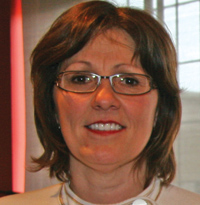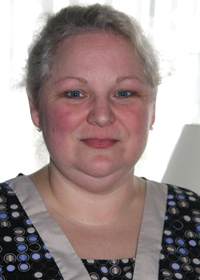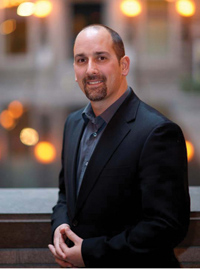
Features
Collaboration
Practice
Massage Therapy in Quebec
In Quebec, there is no official recognition from the provincial government for massage therapy, so, technically, anybody can use the title of massage therapist, whatever their experience and training. However, this has not seemed to dull the enthusiasm the people of Quebec have for massage therapy, and certainly, those who are serious about training to become one will still seek out the best programs.
August 4, 2011 By Martine Frigon
In Quebec, there is no official recognition from the provincial government for massage therapy, so, technically, anybody can use the title of massage therapist, whatever their experience and training. However, this has not seemed to dull the enthusiasm the people of Quebec have for massage therapy, and certainly, those who are serious about training to become one will still seek out the best programs. There are a few problems, though. One is that there are various private organizations in Quebec that offer training for someone who would like to become a massage therapist, but, at this time, someone who enrols in one of these programs will unfortunately, not finish with a provincial diploma. This stands in bizarre opposition to other programs in the field of personal and health care, such as those for hairdressers or beauticians, which grant them provincial credentials upon completing their training.
Another problem is that, in the province of Quebec, there are almost a dozen private organizations and associations that offer guidance for someone who wants to study in the field, and the guidelines set by these groups are not necessarily standardized – depending on whom one speaks with, the requirements for training in massage therapy will vary.
 |
|
| Sylvie Bédard leads the Quebec Federation of Massage Therapists. The federation has certified 18 schools according to its agreement, which requires an accreditation process recognizing the quality of training under five criteria: relevancy, coherence, value of teaching methods, adequacy of resources, and efficiency.
|
For instance, launched in 1979, the Quebec Federation of Massage Therapists is made up of 5,500 massage therapists from across the province and, according to the federation’s executive director, Sylvie Bédard, “Our organization recognizes 18 schools that offer standardized training in accordance with our federation’s agreement related to the accreditation of training schools in massage therapy. Our agreement leads the schools accredited to our federation through an accreditation process whereby the quality of training is recognized on the basis of five criteria: relevancy, coherence, value of teaching methods, adequacy of resources, and efficiency.”
Another group, the Association des massothérapeutes du Québec (Quebec Massage Therapist Association) is made up of 2,273 members and was founded in 1981. “We accept members who have 400 hours and up of training, and we are linked to around 20 private schools,” said Charlotte Bélanger, Secretary-Treasurer for this group.
The Alliance des massothérapeutes (Massage Therapists Alliance), launched in 1999, is made up of 310 members who are located for the most part on the south shore of Montreal. “We propose a basic 400-hour training plus a continuing education program that offers training in additional techniques,” said Marie-Josée Poisson, who is president of this group.
Meanwhile, in 2008, the board of directors of the Massologists and Technicians in Massage Association of Canada – Professional Massage Therapists Association of Quebec decided to standardize their requirements in order to meet the criteria requested in all the Canadian provinces. “We wanted to allow any person who would like to work across Canada to be eligible according to the requirements in each province. Therefore, we require training of 2,200 hours for a massage therapist and 1,100 hours for someone who will only practise in Québec,” said Jean-Claude Bleau, president of this association,which is made up of 2,200 members.
The result of this fragmentation is that, overall, the structure of
training for the profession in the province of Quebec is unclear, making
attaining provincial recognition a next-to-impossible task.
Is provincial accreditation a must?
And what do massage therapists in the province think of this? Are they
bothered by not having government accreditation or recognition? Do they
feel their training is adequate? Are they happy with the many and
varied groups that represent them?
Once again, viewpoints vary throughout the profession in Quebec.
In November 2010, a group of 11 massage therapists launched
Massothérapie Québec in order to initiate a certification process that
will lead to provincial recognition. According to Martin Vallée, the
president of this group, 150 candidates are actually currently in the
process of passing their certification requirements, established
according to a training program of 1,000 hours, and developed by an
organization called Centre de Recherche sur les applications
thérapeutiques du toucher (Research Centre on Therapeutic Application of
Touch.)
 |
|
| Marie-Josée Poisson, president of the Alliance des Massothérapeutes (Massage Therapists Alliance), considers that a 400-hour basic training is sufficient to become a professional, but strongly recommends massage therapists engage in continuous education and learn other therapeutic techniques.
|
“Massothérapie Québec is created to raise the standards of the profession throughout the large number of schools and professional associations that represent massage therapists across the province,” said Vallée, who is also director of Mon Réseau Plus, an organization representing a number of manual therapy groups and made up of 5,700 members.
Vallée points out that part of the barrier to provincial recognition and accreditation in Quebec is a lack of a clear identity for the profession. Massage therapy is perceived only as a relaxation technique requiring little tolerance on the part of clients, and, hence, minimal training in order to perform correctly and safely.
“However, what a lot of people don’t know,” says Vallée, “is that massage therapy can be much more than a way to get pleasant relaxation.”
Vallée hopes that more intense and standardized training and certification will bring the profession closer to government recognition and accreditation and thus help raise awareness that massage therapy can offer a host of benefits for clients in many situations.
According to a survey conducted in April 2010 by the Committee of Personal Care Workers in Quebec – an organization subsidized through the Government of Quebec, specifically by the Minister of Employment and Social Solidarity, that groups representatives from the personal care sector and the government – half of the respondents wish to be certified by a single professional order (not necessarily government run), the mission of which would be to put the emphasis on increased standards and better inspection trends. However, the majority of the respondents (92 per cent) noted that they were satisfied with the training they received and consider themselves well prepared for the world of work in massage therapy.
For Sylvie Bédard, executive director of the Quebec Federation of
Massage Therapists, government recognition and accreditation of training
programs is not a requirement and the current standards of basic
training are acceptable.
A similar commentary has come from Marie-Josée Poisson: “To me, it is
not essential to require 1,000 hours of basic training and to be listed
in a provincial register. As an association, we require our members to
meet our criteria. We will accept members only from schools that meet
our strict standards, and they must pass more exams with us in order to be recognized as one of our massage therapists.”
However, it is worth noting that Poisson states: “basic training of 400
hours is sufficient to meet the needs of customers who require a
relaxation massage or a muscular massage only.” And this, again, raises
the question of the exact identity of massage therapy.
How are massage therapists in Quebec tackling this identity question? It
does seem that, along with some noticeable movement toward government
accreditation and an increase in training requirements, the profession,
in Quebec, is in fact bringing massage therapy into new avenues there,
and perhaps enriching its profile to go well beyond relaxation.
A NEW FEDERATION TO HELP CANCER PATIENTS
On May 18, 2011, the Fédération québécoise des massothérapeutes
officially launched a new foundation called the Fondation québécoise de
la massothérapie.
With the slogan “Lending health a strong hand,” this foundation aims at
contributing to the health and quality of life of people living with
cancer, and particularly senior and family caregivers. To do so,
specialized training will be offered to any massage therapist interested
in this area of expertise.
 |
|
| Martin Vallée is president of Massothérapie Québec, an organization launched in November 2010 in order to initiate a certification process that will lead to a provincial register.
|
Richard Béliveau, PhD, biochemistry, well-known author of books on cancer-risk-reducing foods, researcher in oncology, and professor of biochemistry at Université du Québec à Montréal (where he also holds the chair for the prevention and treatment of cancer), is the spokesperson of this new foundation.
“We need to do everything we can to ease the pain and shock associated with the diagnosis and the stress associated with cancer treatment. In this regard, massage therapy is a well-established technique capable of significantly improving the quality of life of persons with cancer,” he said. “By exerting effects on both the physiological and psychological levels, massage therapy helps to mitigate the symptoms associated with the disease, which may include pain, fatigue, nausea, anxiety and depression.”
“That’s why I decided to personally support this cause which I hold dear,” added Béliveau.
Members of the profession in Quebec acknolwedge that having the support of a well-known research figure is a definite positive step to raising awareness regarding the many benefits of massage therapy but also may increase the number of people who have access to massage care.
WORKING FOR SICK PEOPLE
“Thanks to the massage therapist I met – she helped me to decrease my anxiety during my treatment, and I am sure that this contributed to my remission,” said Gertrude Buteau, a cancer survivor who offered her testimony during the ceremonial.
“The foundation wishes to train more therapists, and we are preparing a curriculum in order to offer training all across the province,” said Jean-François Bouchard, director of research and development at the Fédération québécoise des massothérapeutes.
“We are actually offering a 200-hour training program that includes instruction in physiology, various types of cancers, treatments such as chemotherapy, radiation therapy, side-effects, medications and massages adapted to cancer patients, and other courses will be added on such as pathology, aid relationships and tutorials. The curriculum is expected to be available at the end of this year.”
“In 2011-2012, we hope to offer more than 2,000 massages to cancer patients,” said Sylvie Bédard, executive director of the Fédération québécoise des massothérapeutes and president and CEO of the new foundation. These massages will be offered in the five regional centres that belong to the federation, and are located in Montreal, Quebec, Gatineau, Trois-Rivières and Sherbrooke.
Martin Merrette and Élodie Desprez, both massage therapists who practise in the hospital environment, are also on the team for this foundation, and are dedicated to planning this specialized training.
“ I remember massaging a man who required morphine to relieve his pain,” said Merrette. “Subsequently, he was able to fall asleep without morphine.”
It will be interesting to watch massage therapy develop within the province of Quebec and to observe the path its members take in the years to come to solve the issues they are facing on a number of planes : identity, training, provincial accreditation and recognition, and integration into the health-care system.
Two trends that do seem to be emerging are the move to boost the identity of massage therapy from a relaxation discipline and raise awareness for its many health benefits; and recognition that, in order to do this, massage therapists need to be better trained within longer and more intensive programs.
As Dr. Béliveau notes, “Massage therapy has had a varied and misunderstood reputation, which is unfortunate because massage has been around for millennia. Increasing our involvement within health care is vital to re-establishing awareness of its benefits and making it available to as many clients as possible.”
Martine Frigon has been a freelance photojournalist for 25 years and owner of Reditexte, a small company specialized in writing and translation in French and in English. She has published articles in various magazines. She lives in the Quebec City area and can be reached at reditexte@yahoo.com.
Print this page